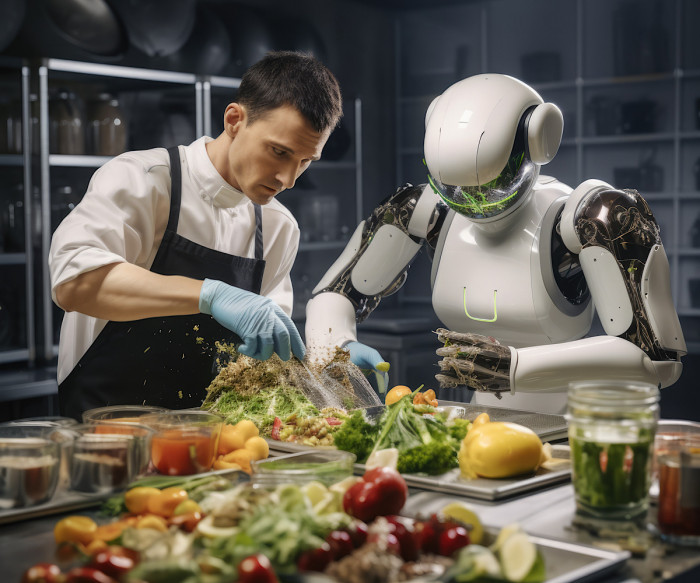News
A Collection Of Restaurant, Food, Drink And Hospitality News From All Over South Africa
Despite the rise of robotics in the kitchen … there’s still an important need for culinary schools
25 August 2025
In an age of rapid technological advancement, the culinary world has seen a surge in the adoption of robotics and automation. From robotic arms flipping burgers to AI systems optimising food production in large kitchens, the future of food preparation appears increasingly mechanised. However, despite this evolution, the need for culinary schools remains critical.
Culinary education offers far more than the technical skills to cook - it imparts creativity, cultural awareness, sensory training and the human touch that machines cannot replicate, and as such, schools such as Capsicum Culinary Studio will continue to play an essential role in shaping the chefs and food professionals of tomorrow.
One of the most compelling arguments for the continued relevance of culinary schools is the inherently creative nature of cooking. Culinary art involves more than following recipes; it’s about experimenting with flavours, textures, techniques and presentations. While machines excel at repetition and precision, they lack the imagination required to innovate. Chefs are artists who use food as a medium and culinary schools nurture this creative spirit through exposure to global cuisines, hands-on practicals and mentorship. No robot can conceptualise a new dish based on cultural fusion or reinterpret a traditional meal with emotional depth.
Further, cooking is a multisensory experience involving taste, smell, sight and even sound. Culinary schools offer structured training to develop a refined palate and the ability to identify subtle flavour nuances - something machines still struggle with. While AI can analyse chemical compositions, it cannot taste or feel food the way humans can. For chefs, learning to trust their senses and use them intuitively is vital. This kind of sensory education cannot be replaced by automated processes, making culinary training indispensable.
Culinary schools also serve as institutions that teach food culture, history and ethics. Understanding where ingredients come from, the traditions behind specific dishes and the significance of food in various communities is crucial for responsible and respectful cooking. Robots may prepare food efficiently, but they cannot comprehend or communicate cultural meaning. Culinary professionals trained in these aspects bring depth and context to their cooking, honouring traditions while innovating responsibly.
In addition, the kitchen is a dynamic environment where leadership, collaboration, and communication are paramount. Culinary schools like Capsicum emphasise soft skills such as time management, conflict resolution and team coordination - skills that are essential for managing real-world kitchens. A robotic system might perform a task flawlessly, but it cannot inspire a team, handle interpersonal issues or adapt to unexpected human needs in the same way a well-trained chef can. Culinary education ensures that future chefs are not only skilled cooks but effective leaders.
Finally, culinary schools are not obsolete in the face of technology - they are evolving with it. Many modern culinary programs now include training in food science, kitchen technology, and even robotics. Rather than being replaced, chefs are being taught to work with machines, integrating automation to enhance productivity while preserving creativity and quality. This hybrid approach reflects the reality of the modern kitchen, where human skill and technological efficiency coexist. While robotics and AI continue to transform the culinary landscape, they do not render culinary schools unnecessary. On the contrary, these institutions are more important than ever. They cultivate the creativity, cultural knowledge, sensory skills and leadership qualities that define great chefs, traits that machines cannot replicate. As we move forward, culinary schools will be the foundation that allows human cooks to collaborate effectively with technology while preserving the artistry and soul of cooking.
Diarise Capsicum Culinary Studio’s forthcoming Open Days happening on August 30,
September 27, October 25 and November 29. These will take place between 09h00 and 12h00 at each of the school’s seven campuses which are located at:
- Boksburg: Unit 6, Bartlett Lake Office Park, Cnr Leith and Trichardts Roads, Boksburg
- Cape Town: 358 Victoria Rd, Salt River, Cape Town
- Durban: 300 Granada Square, 16 Chartwell Dr, Umhlanga Rocks.
- Johannesburg: 3 Keyes Ave, Rosebank.
- Nelson Mandela Bay: 1 Newmarket Rd, Greenacres, Gqeberha.
- Pretoria: Menlyn Square, South Building, 134 Aramist Ave, Waterkloof Glen.
- Ruimsig, Roodepoort: Block D, 144 Peter Road, Ruimsig
For more details contact: chef@capsicumcooking.co.za; telephone 086 111 2433 or visit www.capsicumcooking.com.










